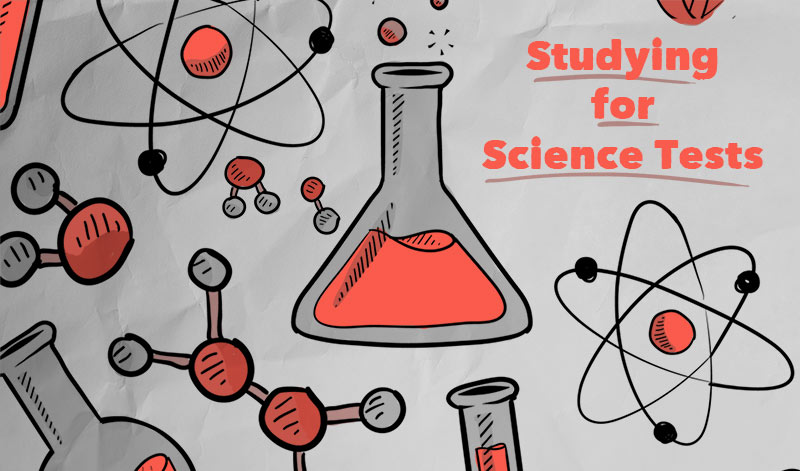How to Study for a Science Test in One Night

In today’s fast-paced college environment, it can be a challenge to find the time to prepare for each assignment and exam in the depth that would be ideal. You are probably torn between a dozen different activities on any given day, from writing and essay to going to practice to working a shift at your part-time job to meeting family responsibilities. So, what do you do when you are pressed for time and a major science exam is looming on the horizon? In this article, we’ll take a look at some of the ways you can study for a science test in just one night to make the most out of the limited time available.
First, it’s worth noting that college and university students do best when they attend class every day and pay careful attention to what the professor says. If you go to class regularly, take careful notes, and read the textbook each week, you will be in a good position to understand what will be on the exam and will have less need to cram for an exam. However, it isn’t always possible to find enough time to devote to every course, so when the worst happens and you need to study for a test fast, what can you do?
Balance Studying and Resting
Your academic future might rest on the outcome of a test you haven’t fully prepared for. The best place to start is to determine how much time you have available to study. Some students might want to stay up all night studying, but if you don’t get any sleep, you will do worse on a test than you might otherwise do because the exhaustion will reduce the efficiency of your mind and make it harder for you to remember the information you were studying. Therefore, one of the biggest tips in preparing for a science test is to make sure you set aside enough time to get a good night’s sleep the night before. Being well-rested will help you to forge new mental connections and keep yourself operating at better efficiency. After deducting the time you will devote to sleep from your available time, consider what more you have to do and what time you can give to studying.
Drink more water, as it helps the brain to work with fewer distractions. Don’t wait till you become thirsty. When you feel like your mind is going numb, eat a menthol candy, or even brush your teeth. Menthol flavor/smell energizes cognitive abilities for a brief period and helps to focus. But don’t use sugar for the same purposes! Or you will experience energy decline very soon.
Your next step is to prioritize the material that you need to review for the test. Not everything is equally likely to appear on the exam. Try to determine which material is most likely to be tested and which material is likely to earn you the highest number of points. By prioritizing the most valuable information, you can be sure to devote your time and energy where it will do the most good. For science tests, making sure that you have memorized the required formulas and have a command of specific vocabulary is probably the best place to start. This information can be applied in a number of different ways and will help you across the questions of the exam.
Pay Attention to Subject Specific Concepts
After memorizing formulas, you should also consider the most important subject-specific concepts. One way to look for these is to review the textbook and examine the headings used in the chapters. This will give you an idea of the major concepts that are of the most importance. By examining the headings, you can anticipate some of the major areas that the exam will cover. Beyond this, the textbook will likely contain boldface or highlighted terms which may or may not appear in a glossary of terms. These vocabulary items will also likely clue you in to specific subjects that you need to know about.
Beyond this, it’s important to recognize that you won’t be able to learn the entire semester’s work in a night. Targeted studying will give you the most bang for your buck, but it’s also important to remember that you need to give your brain a chance to rest. Take breaks while you study to let information soak in and to avoid burnout or study fatigue.
The most precious practice you can employ when getting ready for exams, especially if the time is not enough for relaxed studying, is the Pomodoro technique. It requires a timer and nothing else. You need to work for 25 minutes without distractions and then make a 5-10 minute (define it yourself) break. Every four Pomodoro cycles, you can take a long break of 20-30 minutes. If you follow this routine for two days, you will see how much you can accomplish. It gives enough time to grasp some material and also balances your work-rest routine. There are even books written in support of this method, but, finally, they all describe the same technique. There are mobile and desktop Pomodoro apps you can use.

Don’t Hesitate to Ask for Help When Needed
If all else fails and you have a written exam coming up, an online writing service like Smart Writing Service can help. You might be wary about using a professional writer to help with a paper, but students across the country are taking advantage of some of the most powerful writing services in the world and so should you. Services like these use professional academic writers to produce custom research papers and essays that can show you the right way to approach your topic. When you use the power of a professional writing service, you can take a shortcut through studying for your exam. Many services offer emergency writing services to help students achieve their goals on the tightest of deadlines. Studying for a test in one night is hard, but a little help can make it easier.
































































































